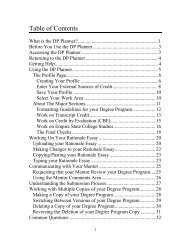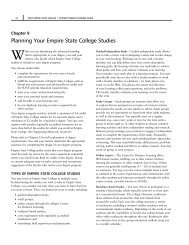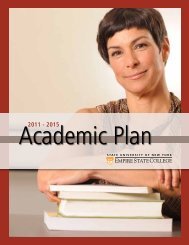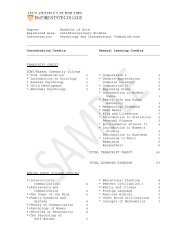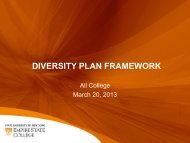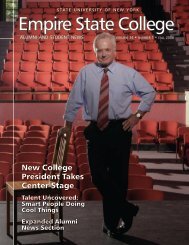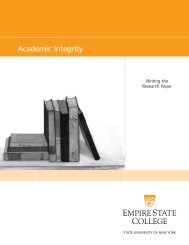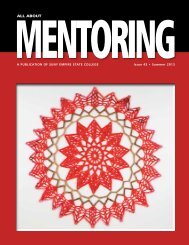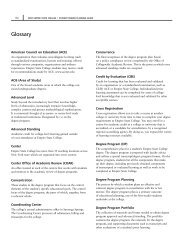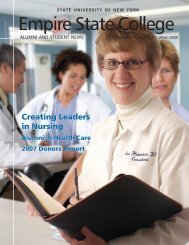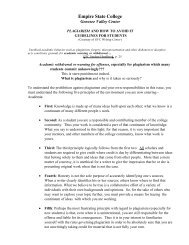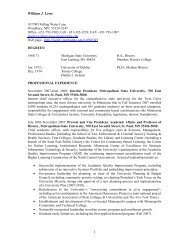All About Mentoring Spring 2011 - SUNY Empire State College
All About Mentoring Spring 2011 - SUNY Empire State College
All About Mentoring Spring 2011 - SUNY Empire State College
Create successful ePaper yourself
Turn your PDF publications into a flip-book with our unique Google optimized e-Paper software.
54<br />
that is unfortunately frozen into law in the<br />
Arizona statute, in the insistence that we are<br />
or can be human persons apart from our<br />
membership in groups with other humans.<br />
With Aristotle, Dewey says: “Individuals<br />
who are not bound together in associations,<br />
whether domestic, economic, religious,<br />
political, artistic or educational, are<br />
monstrosities” (Dewey, 1962). This is not to<br />
deny the legal and ethical responsibility of<br />
each individual for what that person does or<br />
does not do, but to recognize that becoming<br />
an accountable individual is an essentially<br />
social process.<br />
Dewey noted that the opening of a new<br />
continent in America shaped the older,<br />
feudal individualism into a romantic form,<br />
with the energies of individuals focused<br />
on opportunities for personal gain, yet<br />
in the aggregate serving “national life”<br />
(Dewey, 1962). This is the same view that<br />
grounds the contemporary ethos of personal<br />
aggrandizement. We are to pursue our own<br />
interests, becoming entrepreneurs one and<br />
all, and scorning the common or collective<br />
effort implied by any project, policy or<br />
endeavor that is public rather than private.<br />
5. Historically, progressive education is<br />
viewed as breaking with mainstream ideas<br />
about the role and purposes of education,<br />
but it also can be seen as embodying this<br />
same romantic view of the individual<br />
person. Progressive education led the way<br />
in this country in recognizing the interest of<br />
the learner as crucial to significant learning,<br />
but in the version that characterized some<br />
of its leading institutions (e.g., Goddard<br />
<strong>College</strong>, Union Institute, <strong>SUNY</strong> <strong>Empire</strong><br />
<strong>State</strong> <strong>College</strong>), the fundamental assumption<br />
was that the individual exists prior to social<br />
experience, and is given with all those<br />
characteristics that determine interaction.<br />
The Goddard philosophy starts with the<br />
individual. It holds that each person is<br />
truly unique, has his own needs, has to<br />
contend with a special set of problems,<br />
possesses talents peculiar to him, and<br />
is worthy of the respect and love of his<br />
fellow men. It assumes that learning<br />
is inherent, natural, individual, active<br />
and the means to self-fulfillment. It says<br />
that education is the reconstruction<br />
of experience of the individual by<br />
himself for himself, but that it also is a<br />
transactional process through which the<br />
learner is constantly taking something<br />
from his environment and giving<br />
something to it. It is a social as well as<br />
an individual process and it involves all<br />
of the personality, that which we call<br />
intellectual as well as the emotional and<br />
the physical. (Davis, 1996)<br />
The opening assumption that learning is<br />
individual in this statement trumps the<br />
subsequent characterization of it as a social<br />
process, and ignores the social purpose of<br />
education and growth as postulated by<br />
Dewey. It also disregards his criticism (and<br />
Kilpatrick’s [Beyer, 1997]) of the notion<br />
that “the consciousness of each person is<br />
wholly private, a self-enclosed continent,<br />
intrinsically independent of the ideas,<br />
wishes, purposes of everybody else” (Dewey,<br />
1916). The goal of self-fulfillment here is<br />
an individual goal. This point is more than<br />
a theoretical subtlety, since it was very<br />
influential in determining the orientation<br />
of the programs initiated at Goddard and<br />
elsewhere, and in the primacy in those<br />
programs of the individual learning contract<br />
or study plan and independent studies<br />
over the exchanges of ideas, questions and<br />
responses in which “knowing” occurs.<br />
That is not to say that there were no<br />
group settings included in the programs,<br />
but typically they were occasions for the<br />
display and presentation of individual<br />
projects, rather than regular opportunities<br />
for the collaborative construction of<br />
understandings. In this respect, certain<br />
interpretations of Dewey’s thinking and<br />
their implementations did not depart<br />
from mainstream American educational<br />
philosophy, which has generally treated<br />
learning as a solitary pursuit, with learners<br />
side-by-side, but rarely together.<br />
6. It also is interesting to find that this last<br />
citation from Dewey appears on many<br />
websites these days as evidence of the<br />
insidious, pernicious and un-American<br />
socialist tendencies of Dewey and<br />
Deweyeans. This misreading could be<br />
reinforced by the language of the question<br />
he put as a corollary to the critique of<br />
atomistic individualism: “Given feelings,<br />
ideas, desires, which have nothing to<br />
do with one another, how can actions<br />
proceeding from them be controlled in a<br />
social or public interest” (Dewey, 1916).<br />
Control of the sovereign individual is exactly<br />
the bugaboo, the taboo, the evil empire<br />
that we are to combat and that threatens us<br />
and our persons, according to the thinking<br />
that seems to inform both the Arizona<br />
school legislation and much current political<br />
invective. Reading Dewey’s “controlled”<br />
to mean “focused” or “directed” would<br />
be more consonant with his overall<br />
position, although the roots of the darker<br />
interpretation are deep in our history and<br />
culture. While the depiction of the natural<br />
and ideal human condition as the unfettered<br />
competition of completely autonomous<br />
persons – each owing nothing to the others –<br />
may appeal, it has long had its detractors.<br />
Hobbes is the most obvious. Anarchy and<br />
civil war cannot support civilization, and<br />
he thought that we would give up a good<br />
part of our liberties to avoid social chaos.<br />
Total freedom leading to unfreedom, total<br />
responsibility leading to irresponsibility:<br />
is this the true foundation of progressive<br />
educational thought<br />
References<br />
Beyer, L. E. (1997). William Heard<br />
Kilpatrick: (1871-1965) [Electronic<br />
version]. PROSPECTS: The Quarterly<br />
Review of Comparative Education,<br />
XXVII, No. 3, pp. 470-85.<br />
Davis, F. K. (1996). Things were different<br />
in Royce’s Day: Royce S. Pitkin as<br />
progressive educator: A perspective<br />
from Goddard <strong>College</strong>, 1950-1967.<br />
Adamant, VT: Adamant Press.<br />
Dewey. J. (1916). Democracy and education.<br />
Retrieved from http://www.ilt.columbia.<br />
edu/publications/Projects/digitexts/<br />
dewey/d_e/chapter22.html<br />
Dewey, J. (1962 ,1930). Individualism old<br />
and new. In J.J. McDermott (Ed.) The<br />
philosophy of John Dewey: Vol. II, The<br />
lived experience (pp. 608-620). New<br />
York, NY: G.P. Putnam’s Sons.<br />
Lacey, M. (<strong>2011</strong>, Jan. 8). Rift in Arizona as<br />
Latino class is found illegal. The New<br />
York Times. Retrieved from http://<br />
www.nytimes.com/<br />
Shear, M. (<strong>2011</strong>, Jan. 12). Palin calls<br />
criticism ‘Blood libel.’ The New York<br />
Times. Retrieved from http://www.<br />
nytimes.com/<br />
suny empire state college • all about mentoring • issue 39 • spring <strong>2011</strong>



